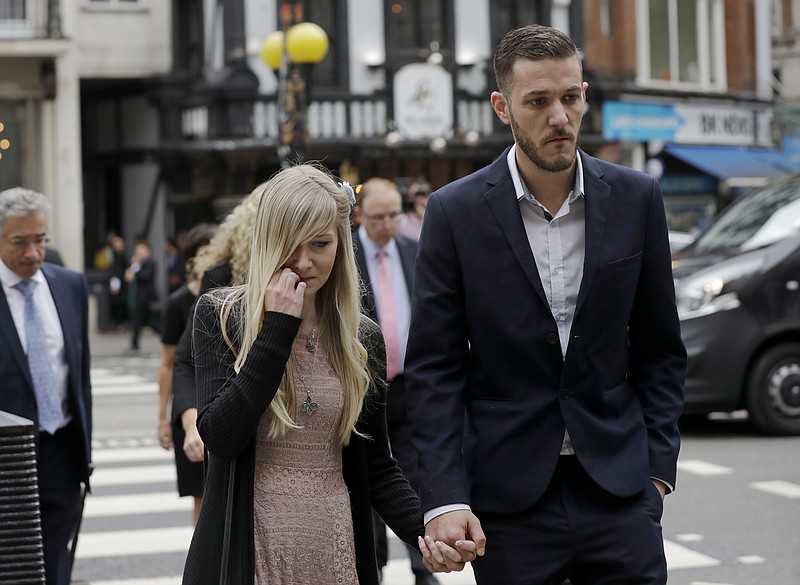We presume that Connie Yates and Chris Gard were able to determine the disposition of the final remains of their tiny son without the help of the United Kingdom's National Health Service.
For the last nine months of Charlie's 11-month-old life, they had little say about what happened to him.
The controversial case is what Americans have long feared about a potential single-payer health care system - that family would not get a say in determining what is best for their loved one.
Democrats would foist such a system upon us right now if given the opportunity. With Hillary Clinton as president and a Democratic Congress, legislation already would be in the works. And, unlike with Republicans, members would stick together, for better or for worse.
It's why, after all, they've fought so hard to keep the fatally flawed Affordable Care Act (ACA). The original idea, many Democrats have whispered, was to graduate from the ACA to a totally government-run system after insurance companies could not longer afford to pay the freight.
We're under no illusion that perhaps close to half the population would be glad to turn their health care choices over to the government - as long as it paid. Lose your insurance plan? Fine. Lose your doctor? Fine. Not have to pay for your health care? Even better.
When it comes to making end-of-life choices, though, we believe there would be pushback even from those who would have the government make every other health care choice for them.
Telling us we can't take some extraordinary measures to save our child or prolong Gramma's life if it's what she wanted is somehow un-American. It goes against our rugged individualism, our response when someone tells us we can't do something, our belief that in this country anything can be accomplished.
It's likely, at least at the end of Charlie Gard's life, nothing could have been accomplished. He had mitochondrial DNA depletion syndrome and was believed to be only the 16th person ever discovered to have it. The disease in time, destroys motor skills. He couldn't see, swallow or move his limbs. Indeed, he couldn't breathe without a ventilator.
Much earlier, though, his parents had found an American doctor who was using experimental treatment for this condition. And the doctor was willing to treat the baby. And the parents had started a GoFundMe page that took in pledges of $1.8 million to pay for their son's care.
Depending on when they learned all of that, perhaps there was a prayer.
But the hospital, under the auspices of the National Health Service, said no. It wasn't, they said, "in the best interest of their patient."
"Their patient."
A month later, the hospital sought a court order forcing the staff to turn off Charlie's ventilator. His parents, quite naturally, disagreed. The ensuing court case dragged on for seven months. In time, the United Kingdom's High Court agreed with the hospital, saying it was in the baby's self-interest to die rather to try to keep living. In June, the European Court of Human Rights - an interesting name, considering the circumstances - declined to take the case, sustaining the High Court ruling.
Although it was probably too late by that time for any experimental treatment, the British Supreme Court closed off the possibility by agreeing with the legality of blocking the baby's parents from seeking care for him in the U.S. and allowing the hospital to discontinue life support.
All cases are different, but, according to Townhall, Brexit leader Nigel Farage told a Fox News audience last week about a British boy with brain cancer four years ago whose parents wanted to take him to the Czech Republic for experimental treatment. National Health Service doctors said it wouldn't work, but the parents took their son anyway. The treatment worked, and the boy is cancer free.
The parents, however, were briefly imprisoned. The treatment, once forbidden, is now permitted by the country's socialist medical service.
Americans can probably cite at least one case involving a family member or friend or friend of a friend where all hope was gone; nevertheless, the patient recovered.
Lest that type of case happen to one of our loved ones, we believe most of us are not willing to cede these decisions to the government. Fortunately, many family members already have final directives, living wills or powers of attorney to make many of these decisions. In the best of situations, family members, in the case of an elderly person, or parents, in the case of a child, agree on a course of action.
We long to return to a day of patient-centered care but are afraid that train is gradually carrying us far from that station. Even Republican plans to replace the ACA keep too many - for us - tentacles of government wrapped up in our health care. No matter what may come in the future, though, we think Americans - even those who favor an entirely government-run system - will balk at any tenet that allows the health care system to step in and make the life and death determinations that belong to family members.
